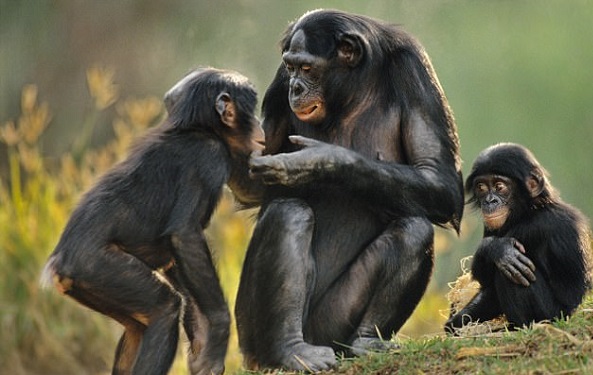Human children have a tendency to spontaneously imitate the actions they observe around them, even when those actions have no apparent purpose.
Bonobos, on the other hand, are far less willing to copy. According to Daily mail.
A new study compared the imitative behaviour of bonobos with that of 3- to 5-year-old children, revealing striking differences in the way it plays out – and, the experts say this unique characteristic could be critical in setting human culture apart.
According to the researchers, imitation plays an important role in human culture, as it underlies how we acquire and pass on traditions.
Bonobos are humans’ closest living great ape relatives, and are known to exhibit many human-like qualities.
But, the new study found that these apes do not take to imitation the way we do.
The researchers examined imitative behaviour in 77 typically developing children, and 46 untrained bonobos living in naturalistic forest.
‘Our results show striking species differences in imitation,’ said Zanna Clay, assistant professor of psychology.
‘The young children were very willing to copy actions even though they served no obvious function, while the bonobos were not.
‘Children’s tendency to imitate in this way likely represents a critical piece of the puzzle as to why human cultures differ so profoundly from those of great apes.’
In the experiments, the children and bonobos were shown a small wooden box with a reward inside.
Before opening the box, the experimenter would carry out ‘nonsensical actions,’ including waving a hand over the box, or tracing an imaginary line over it.
Then, the participants were given the box without any instructions.
While most of the children were found to imitate these actions spontaneously, the bonobos made no attempt to do so.
According to the researchers, these ‘striking species differences’ indicate that humans have unique abilities when it comes to imitation.
‘The fact that the bonobos failed to imitate demonstrates that even enhanced social orientation may not be enough to trigger human-like cultural learning behaviours,’ said Claudio Tennie, research group leader, who coauthored the study.
‘Although some animals show some limited abilities to copy, copying actions that have no apparent purpose appears to be uniquely human.
N.H.Kh

